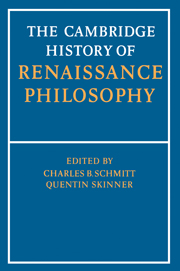Book contents
- Frontmatter
- Introduction
- PART 1 THE INTELLECTUAL CONTEXT
- PART 2 PHILOSOPHY AND ITS PARTS
- 6 Logic and language: Traditional logic
- 7 Logic and language: Humanistic logic
- 8 Natural philosophy: Traditional natural philosophy
- 9 Natural philosophy: The new Philosophy of nature
- 10 Natural philosophy: Astrology and magic
- 11 Moral philosophy
- 12 Political philosophy
- 13 Psychology: The concept of psychology
- 14 Psychology: The organic soul
- 15 Psychology: The intellective soul
- 16 Metaphysics
- 17 Problems of knowledge and action: Fate, fortune, providence and human freedom
- 18 Problems of knowledge and action: Theories of knowledge
- 19 Problems of knowledge and action: Epistemology of the sciences
- 20 Philosophy and humanistic disciplines: Rhetoric and poetics
- 21 Philosophy and humanistic disciplines: The theory of history
- PART 3 SUPPLEMENTARY MATERIAL
- Biobibliographies
- Bibliography
- Index nominun
- Index rerum
- References
19 - Problems of knowledge and action: Epistemology of the sciences
from PART 2 - PHILOSOPHY AND ITS PARTS
Published online by Cambridge University Press: 28 March 2008
- Frontmatter
- Introduction
- PART 1 THE INTELLECTUAL CONTEXT
- PART 2 PHILOSOPHY AND ITS PARTS
- 6 Logic and language: Traditional logic
- 7 Logic and language: Humanistic logic
- 8 Natural philosophy: Traditional natural philosophy
- 9 Natural philosophy: The new Philosophy of nature
- 10 Natural philosophy: Astrology and magic
- 11 Moral philosophy
- 12 Political philosophy
- 13 Psychology: The concept of psychology
- 14 Psychology: The organic soul
- 15 Psychology: The intellective soul
- 16 Metaphysics
- 17 Problems of knowledge and action: Fate, fortune, providence and human freedom
- 18 Problems of knowledge and action: Theories of knowledge
- 19 Problems of knowledge and action: Epistemology of the sciences
- 20 Philosophy and humanistic disciplines: Rhetoric and poetics
- 21 Philosophy and humanistic disciplines: The theory of history
- PART 3 SUPPLEMENTARY MATERIAL
- Biobibliographies
- Bibliography
- Index nominun
- Index rerum
- References
Summary
The range of Renaissance discussions of cognitive status and means of acquiring knowledge in the various scientiae is extensive. Certain difficulties attendant on the attempt to survey this field deserve mention at the outset. To start with it should be noted that only a small part of the field has been subject to scholarly attention. Further, much of the recent literature is primarily concerned with the issue of continuity between Renaissance epistemology and the epistemologies associated with the ‘new’ science of the seventeenth century, sometimes with scant regard to intellectual, disciplinary and generic contexts. Epistemology of the sciences is not, it should go without saying, a Renaissance notion: no Renaissance category even remotely corresponds to ‘the sciences’ or ‘the natural sciences’ in our senses of the terms; and current conceptions of epistemology are at best dimly foreshadowed in Renaissance logic and psychology. In imposing an artificial unity on discussions of method and status in the scientiae we run obvious risks of anachronism in selection and interpretation of material. In the following account attention is confined to topics in the epistemology of disciplines that were, from the curricular point of view, orthodox – natural philosophy, medicine and mathematics. This is a drastic restriction, for much of the most innovative debate of the period on questions of attainment of knowledge concerns disciplines whose credentials as scientiae were perceived as questionable: the ‘unorthodox’ sciences, astrology, alchemy, natural magic and so on; and the practical and operative disciplines, architecture, cartography, military engineering and the like.
- Type
- Chapter
- Information
- The Cambridge History of Renaissance Philosophy , pp. 685 - 712Publisher: Cambridge University PressPrint publication year: 1988
References
- 22
- Cited by



